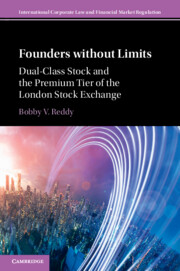‘Shareholder democracy’ and ‘corporate purpose’ are concepts periodically cited in the context of dual-class stock.Shareholder democracy, and the contention that one share, one vote is democratic or just plain fair, although an elegant soundbite, has been disputed, with many commentators opining that one share per shareholder is a better representation of democracy, and that analogies between corporate governance and political theory are built on fragile grounds.In relation to corporate purpose, commentators have vacillated between ideologies of shareholder primacy and stakeholder pluralism over the years, with numerous ‘theories of the firm’ being proposed to justify, often opposing, ideals.However, the United Kingdom’s regulatory environment prioritises shareholders, the premium tier prohibition on dual-class stock stems from a presumption that it harms public shareholders and institutional shareholders, who are traditionally antagonistic to dual-class stock, enjoy significant influence on the UK public markets.Therefore, whatever one’s predilections on the shareholder primacy/stakeholder pluralism debate, when considering dual-class stock, the impact on public shareholders is key.Additionally, although Big Tech has attracted a hostile press in recent years, the potentially pernicious dominance of large tech companies is not an attribute unique to dual-class stock, and, in fact, dual-class stock could inspire greater competition in the industry.


